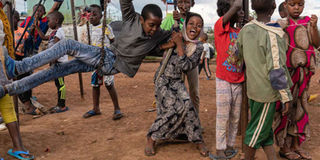No playgrounds for children as buildings take up space

Children play in Korogocho, Nairobi. PHOTO | BART KAMPHUIS
Sylivia Adhiambo, 13, stared at passersby as they walked past their small, semi-permanent house in Lindi village in the belly of Kibera slum. As far as her eyes could see, was a collage of mud or metallic structures packed side by side. She heard giggles of children playing and chasing each other around.
It was at the end of 2019 and schools had been closed until January this year. Children were home, but there are no playgrounds in sight for them to play on. What was available was little corridors between the houses, the bridge close to Sylvia’s home or the dirty stream of black, murky water underneath the bridge where they played with floating bottles and tins.
“If you want to play you have to walk for a long distance. But, even walking there is risky,” she said.
As a girl, she said, walking o those playgrounds would make her an easy target to criminals. Also some schools, owned by NGOs, restrict the use of their playgrounds.
Her school is located within Olympic Estate, and there is nowhere to play. “Sometimes, my school organises field trips so that we can go and play - we call it ‘fun day’. But, it comes at a cost - transport and food,” added Sylvia.
Her neighbour, nine-year-old Marina Isabel, who is in Class Four chipped in: “We end up playing near sewers. For example, if you’re a soccer player and want to practise, you can’t.”
Not far from Olympic, at Toi Primary School, Domitila Wangui, a football coach for girls under 10 years, faces a similar challenge. While the school has a playground where she trains football, pupils at the school get first priority. This makes it harder for outsiders, like Sylvia, to play there.
“A majority of children in this area love football and it would be good for them to find a place where they will be guided, play and have fun as kids,” added Wangui, who is affiliated to Uweza Foundation, an NGO in Kibera, which uses football and art for children’s development.
CONDITIONED GAMES
Physical activity in children helps improve their general health. Experts discourage a sedentary lifestyle for children, which has been attributed to poor mental health and delayed development.
According to World Health Organisation, failure to meet current physical activity recommendations is responsible for more than five million deaths globally each year across all age groups.
Over the years, development has seen the rise in buildings, taking up any available space and denying children, particularly in urban cities like Nairobi, a place to play.
Festus Muturi, the quality assurance officer in the Education ministry said: “Schools ought to have adequate space to play. There are rules and regulations before one can register a school such as availability of adequate grounds.”
In the event playgrounds are not available, classrooms can work too, he added.
“In such scenarios, we recommend teachers facilitate conditioned games, that is, games that can be done in classrooms. They involve creative movements that ensure learners move their bodies in shapes and counting numbers,” he said.
Caroline Thiong’o, a research officer, Education and Youth Empowerment Unit at the African Population and Health Research Centre expressed concern about the shrinking spaces. “When children play, they learn communication skills, how to solve problems and generally, it supports their interaction and development in social skills,” she says.
But amid these challenges, a youth group in Korogocho has transformed a dump site into a small play area. Until a few years ago, “Korogocho People’s Park” was a landfill with waste and a hideout for criminals.
Now, there is a reclaimed green oasis by Komb Green Solutions - a group comprising former gang members involved in criminal activities.
Fredrick Okinda a parent in Korogocho slums kept an eye from a distance. His children were playing on the swings and slides at the park. “I am glad that we now have a safe space where our children can come and play, and their parents can watch over them,” said Okinda.


